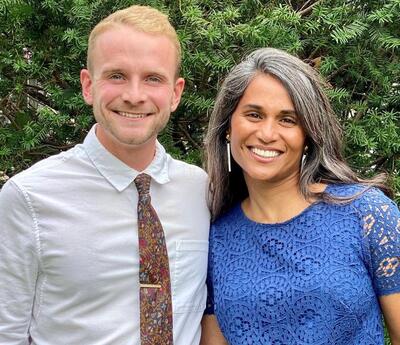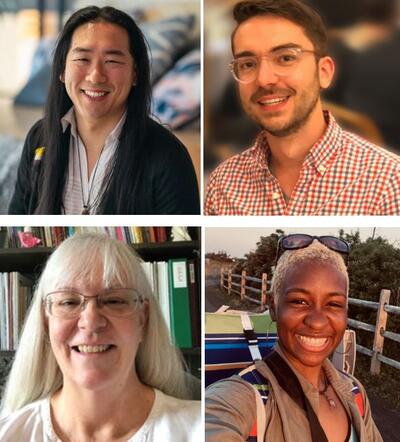By Leah Silvieus ’21 M.A.R.
The COVID-19 pandemic has forced many people to reckon with new complications in providing spiritual care. Ross Pennock ’21 M.Div. is one of those people.
 While serving as Director of Communications for Christ Church Coronado and Christ Church Day School in California after graduation, Pennock observed how the pandemic was compounding the challenges faced by faith communities, including the inability of some people to access in-person meetings because of health issues, clergy being spread too thin, and the continued decline of young people attending church.
While serving as Director of Communications for Christ Church Coronado and Christ Church Day School in California after graduation, Pennock observed how the pandemic was compounding the challenges faced by faith communities, including the inability of some people to access in-person meetings because of health issues, clergy being spread too thin, and the continued decline of young people attending church.
In response, Pennock and his partner, Miriam Morris, co-founded Spiritualize, an online platform that matches people who seek to deepen their spiritual practice with experienced spiritual directors.
“We were always about people first,” Pennock says. “We asked ourselves: how can we create something that’s very nimble, small, and non-obtrusive that helps people connect to people?”
Pennock and Morris began by researching ways to improve accessibility in spiritual care. They wanted to create a resource that churches could use within their communities while also appealing to people wary of religious institutions.
They noticed that Spiritual Directors International (SDI) website, the current go-to resource for locating a spiritual director, offered an extensive database of directors but left it up to the seeker to understand a practitioner’s availability, location, rates, credentials, and type of healing work offered.
In addition to making the process easier for users, Pennock and Morris also wanted to build a multiracial and intergenerational platform in order to address the spiritual care needs of those who tend to be underrepresented or overlooked.
“We really wanted to be intentional about representation from a practitioner standpoint so we could serve as many needs as possible, especially early on,” Pennock says.
With the SDI resource, a person might find a good match with a spiritual director only to discover that geographical distance might pose an insurmountable challenge. But the digital nature of Spiritualize allows clients to meet with spiritual practitioners regardless of their geographical location.
Another aspect that sets Spiritualize apart from other spiritual direction organizations is its willingness to accept candidates (like seminary or divinity school graduates) who have not been trained at a recognized spiritual direction institute. Pennock found that many of his peers emerged from seminary with an M.Div. and spiritual direction experience in the context of Clinical Pastoral Education (CPE) or field work but were still searching for ways to apply their spiritual gifts and training outside of an ordained clergy setting. Spiritualize provides them this opportunity.
To qualify as spiritual directors through Spiritualize, practitioners must have prior experience in spiritual direction, be ordained in a legally recognized church, have a Master of Divinity (or a related degree) with one credit (400 hours) of CPE training, or have been trained and certified by a recognized spiritual direction institute. In addition, they must either currently work with their own spiritual director or attend group supervision for spiritual directors. After applying, candidates go through extensive reference checks.
After the research stage, Pennock and Morris began working on the platform itself. Since neither of them had a background in tech, they initially considered hiring a developer—but soon realized that route would get expensive very quickly. Pennock says he benefited from the no-code movement, which has produced multiple tools and apps that do not require knowledge of computer code.
“Technology is becoming more and more accessible,” Pennock says. “This idea just happened to hit technology innovation at a time when I was able to build something myself over a six-to-eight-month span at a very low cost.”
The grassroots project is funded out of pocket and with a few family donations. To keep the project on schedule and within budget, Morris has applied her background in supply-chain operations—work she has done primarily in supplier negotiations and stakeholder collaborations and product launches in the beauty and food sectors.
“I’d like to think of myself as the person that can get you from point A to point B in the most efficient way, with a process in place that you can repeat on your own the next time,” Morris says. “Ross came up with the ideas, and I built out the necessary process and procedure to make them a reality.”
Morris also invited Teresa Cariño Petersen to help them create a standard of care for practitioners on the platform.
Morris first met Cariño Petersen during their service year with the Jesuit Volunteer Corps in New York City. Cariño Petersen has worked in community organizations and religious institutions in pastoral and formation roles, and her master’s thesis at JST Berkeley was about improving spiritual care.
“It felt very logical to ask Teresa for help,” Morris says. “We gave her our vision for what a code of conduct for our practitioners should look like, and she did a great job of taking our values and applying them to an eloquent living document for our standard of care.”

Johnson, who currently serves as a Pastoral Associate at a Catholic parish outside Richmond, Va., and is a board member of Richmond Hill, an ecumenical Christian fellowship and residential community, became interested in Spiritualize because of her passion for exploring new ways to help people of all faiths, and of no faith, to explore and grow spiritually.
“I think that any time we can meet people where they are and help them engage questions of meaning, we are doing the work of ministry,” Johnson says.
Joseph Cundiff ’21 M.Div., who is interim Priest in Charge at St. Luke’s Episcopal Church in East Hampton, N.Y., and manages partnerships for the platform, adds that while the “nones” might be on the ascent, he doesn’t believe there’s actually a decline in people seeking spiritual experiences. Spiritualize can be a way of bridging the gap between those who want to cultivate a spiritual practice but do not formally belong to a worshiping community.
People interested in accessing a spiritual director through Spiritualize fill out an online form that asks them to select their top two priorities in a spiritual director from a drop-down menu. Among the options are “LGBTQIA+,” “Creation Care,” “Elder Care,” and “Liberation Theology.” “Atheism,” “Agnosticism,” and “Spiritual not Religious” as well as more traditional Christian foci such as “Christian Prayer/Scripture” and “Ignatian Spiritual Exercises.”
There are also options to choose practitioners who focus on specific life experiences such as 12-step recovery and community organizer/justice worker support. Seekers can reach out to a spiritual director directly, or Pennock’s team can facilitate a match based on their needs.
Not everyone Pennock meets has embraced this digital approach to spiritual direction. Some doubt that a remote format can be as intimate as an in-person session, though Pennock believes it is possible to be just as present remotely as in person, depending on the needs of each individual. Sometimes, a remote format is the most accessible—or only—option for those who cannot attend in-person meetings. Others have general doubts about the spiritual value of digital platforms, but Pennock hopes that Spiritualize might encourage people of faith to think more broadly about the potential for technological innovation in spiritual care.
As Johnson finds, the digital format might make spiritual direction less intimidating for reluctant seekers. “I have found that doing spiritual direction online is very effective,” Johnson says. “It’s a ‘way in’ for folks who might be hesitant about walking into a church or meeting in someone’s home or office.”
Leah Silvieus ‘21 M.A.R. is a poet and writer working at the intersection of religion and literature. She is author of the poetry collection Arabilis (Sundress Publications) and is the co-editor with Lee Herrick of the anthology The World I Leave You: Asian American Poets on Faith and Spirit (Orison Books).